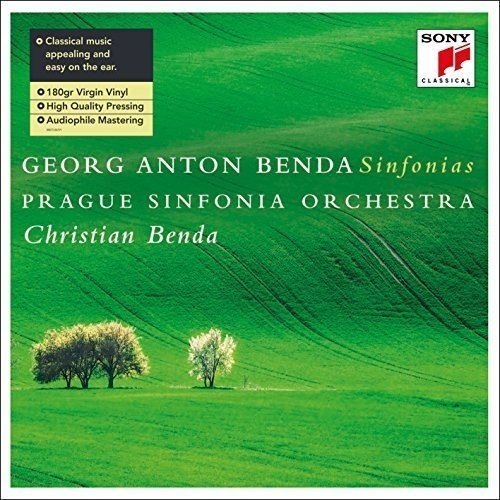| NEW RELEASE Mozart versus Salieri: Rivalry? SONY CLASSICAL - 2 CDs Prague Sinfonia Orchestra/ Christian Benda |
 |
 GEORG ANTON BENDA: Sinfonias - PRAGUE SINFONIA ORCHESTRA - CHRISTIAN BENDA
GEORG ANTON BENDA: Sinfonias - PRAGUE SINFONIA ORCHESTRA - CHRISTIAN BENDA
Sony Classical presents Georg Benda and his Sinfonias
Vinyl LP
_______________________________________________________________________
GEORG ANTON BENDA
We are in Prussia during the 18th century, and more precisely in Potsdam, at Sanssouci Castle. The three brothers Franz, Georg Anton and Johann Benda, born in Alt-Benátky near Prague, work here as musicians and composers at the court of Frederick the Great. Georg is very impressed by the enlightened and tol- erant atmosphere of the court, where Voltaire is a regular visitor. He becomes a Protestant and a Freemason. Even though the king is a musician, he has no taste for musical innovation. Georg cannot develop his skills as a composer at Sanssouci and he is only second violin in Frederick the Great’s orchestra. He therefore moves in 1750 to the court of Saxe-Gotha, where he can express his innovative talent as Hofkapellmeister.
As a child, he studied rhetoric and “expressive declamation” at school, which now helps him be- come the best representative of the “melodramatic form” recently created by Jean-Jacques Rousseau. Gotha’s court orchestra (Hofkapelle) commissions church, court and theatre music, but no opera. Nonetheless, Xindo Riconosciuto, Benda’s only Italian opera, is premiered at the court in 1765. But finding no stimulation for the composition of dramatic music, he requests a six-month study trip to Italy. He is already 43 years old when he visits Venice, Bologna, Florence, and Rome. Five years after his return from Italy, he is appointed Kapelldirektor in Gotha.
In 1774, Europe’s most famous theatre company, founded in 1769 by Abel Seyler, a Swiss banker, actor and philanthropist, settles at the court of Gotha. The company’s repertoire includes German plays, Sing- spiele and Rousseau’s melodrama Pygmalion (a piece that also inspired Benda). Seyler establishes Gotha’s first Masonic lodge; Georg and the Duke of Saxe-Gotha-Altenburg are among its members. He also com- missions Benda to compose several melodramas, including Medea and Ariadne auf Naxos. The latter receives rave reviews in Germany and throughout Europe, highlighting the originality, sweetness and ingenious skill of the work. Further compositions of the Gotha period follow: Benda’s Singspiele Romeo und Julie, Walder and Der Holzhauer. Benda leaves his post in 1778, apparently after a dispute with the composer Anton Schweitzer, Kapellmeister of the Seyler troupe and the Gotha Theatre.
Seeking employment in vain, he travels to Hamburg, Mannheim, Berlin and Vienna. Wolfgang Amadeus Mozart, after a performance of Medea in Mannheim, writes on November 12, 1778 to his father: “I saw such a piece twice here with the greatest pleasure! – Really – nothing ever surprised me more! What I saw was “Medea” by Benda; he also composed another one, “Ariadne auf Naxos”, both thorough- ly excellent; you know that among the Lutheran Kapellmeisters Benda always was my favourite; I like these two works so much that I carry them about with me.” In another letter he adds: “My passion for this kind of work is immense”. Benda inspired the 24-year-old Mozart for his opera Zaide (1780) and, as late as 1791, the Introitus of Mozart’s Requiem, written shortly before his death, is strongly reminiscent of the Trauergesang “Im Grabe wohnt Vergessenheit” from the third act of Romeo und Julie composed by Benda 15 years earlier (1776). In Vienna, Benda composes his last melodramas Theone and Pygmalion, and returns to Gotha where he receives a pension for life.
He then withdraws from social events and lives far from all cities, working primarily at the preparation of an edition of his earlier musical works. In 1781, he travels again to Paris, where he puts on a performance of Ariadne auf Naxos, and in 1792 he definitively ends his career as a composer with his cantata Bendas Klagen. During his last years his interest is focused on the political ideas of the French Revolution and he devotes himself to philosophy.
All of Georg Benda’s five children become musicians, singers or actors. The following anecdote illustrates nicely his character and his nature: his wife has just passed away and he goes to the piano to express his grief through soulful modulations. On being asked whether to send out the notices of his wife’s death, Benda, thoroughly absorbed in his music and charmed by his inventions, goes into her room to discuss it with her. Only at the sight of her lifeless body does he realize again what happened.
Georg Benda dies in Köstritz in Thuringia at the age of 73.
_______________________________________________________________________
Classical Source - Antony Hodgson - December 2016 (5 out of 5)
Later generations of the Benda family inherited much musical talent including conductor (and composer) Christian whose performances are given on this recording in convincing style. Benda exploits the horns high in their register. The Prague Sinfonia has a fine horn section and these musicians perform their demanding melodic passages with immaculate accuracy. In the C-major Symphony that ends the programme the conductor’s firmly rhythmic treatment of the Minuet-like Finale gives suitable weight to this work. The Benda Symphonies are superbly played and are given excellent recorded sound within a spacious acoustic.
_______________________________________________________________________
Gramophone - Balazs Zay - August 26, 2016
Christian Benda conducts cleverly, lively, colorfully. These are no doubt very good pieces. A valuable niche publication.
____________________________________________________________________
Classical Ear - Evan Dickerson - June 7, 2016
Much wit and colourful invention… Each Sinfonia’s performance is keenly accented and serves the music well, with faster movements being the main draw. There is an obvious affection in Christian Benda’s conducting… The recording is bright… favouring the Prague Sinfonia Orchestra’s upper strings… A likeable venture.
____________________________________________________________________
Full sunshine (4 out of 4) - Musikzen - L'air du jour - Marc Vignal
Family history - Benda (Georg Anton) vigorous thanks to Benda (Christian)
Maybe this CD (only six symphonies) will be followed by another one. It is to be wished, because the interpretation is of the highest caliber, both vigorous and precise, under the direction of Christian Benda.
____________________________________________________________________
klassik erleben - Helmut Peters
Listening to Christian Benda's fantastic recording of six symphonies by his ancestor with the Prague Sinfonia Orchestra, one is convinced that the musical language of the Bohemian composer must just be in the conductor's blood.
____________________________________________________________________
De Volkskrant - Biella Luttmer - April 20, 2016
Prague Sinfonia Orchestra makes early classical pieces almost swinging
They blow you full in the face the sinfonias of Georg Anton Benda (1722-1795): fresh and spring-like, with strings that cannot wait to play their hectic rhythms.
The young Mozart wrote all this to his father: "I have heard here twice with the greatest pleasure Medea by Benda. Never before was I so taken. (...) You know that among the Lutheran Kapellmeister Benda was always my favorite. I love these works so much that I carry them with me. "
The instrumental pieces by the composer from the region that is now part of the Czech Republic, played by a czech symphony orchestra, led in a strikingly brilliant way by one of Benda's descendants: Christian Benda.
He has a good eye for the different characters in the works and keeps everything rhythmically so well in hand that the early classical pieces are almost swinging.
____________________________________________________________________
Pizzicato - Guy Engels - April 26, 2016
Refreshing Benda symphonies
Christian Benda shapes the six short symphonies in an equally refreshing, relish, virtuosic and captivating way. The conductor makes his orchestra shine, gives the musical text charm and provides it with delicate bright tones. The music never stops, pulsates constantly, and thanks to a detailed reading remains always exciting.
____________________________________________________________________
Radio-Canada - Frédéric Lambert - April 29, 2016
"It is precise, it is admirable and it is conducted by his direct descendant after three centuries," says Frédéric Lambert about Georg Anton Benda: Sinfonias, an album dedicated to the symphonic works of the Czech composer of the 18th century, who particularly influenced Mozart. It is indeed the violinist Christian Benda, from the same family as the composer, who conducts the Prague Sinfonia Orchestra on this opus. Frédéric Lambert calls this album a brilliant madness and explains to Catherine Perrin why he recommends it to anyone wishing to discover lesser-known composers.
____________________________________________________________________
Classique News - Lucas Irom - May 1, 2016
Nice idea of playing his symphonies...
Even on modern instruments, orchestra and conductor know how to emphasize weightlessly the expressive palette of a hypersensitive Benda. The panache, the regular pulse - despite a too distant and echoing sound, the fineness of conducting, the excellent sense of contrasts, the expressive vitality, which obviously refers to Gluck and even seems to anticipate Joseph Haydn, gives here justice to a first symphonic corpus confirming the eloquence and maturity of a composer active in the 1760s and 1770s, pioneer figure of the language of the European Enlightenment.
____________________________________________________________________
IBS - Italy
Maestro Christian Benda conducts the music of one of his ancestors with the Prague Sinfonia Orchestra
In this recording he gives us a lively interpretation of some symphonic works by Georg Anton, well known and respected by Wolfgang Amadeus Mozart. Let us hear with satisfaction six rare symphonies in three movements in an excellent rendition also by the Prague Sinfonia Orchestra.
- MOZART VERSUS SALIERI: RIVALRY?
- SONY CLASSICAL - VINYL & CD
- ROSSINI - BLU-RAY High Definition
- SCHUBERT - Complete Overtures